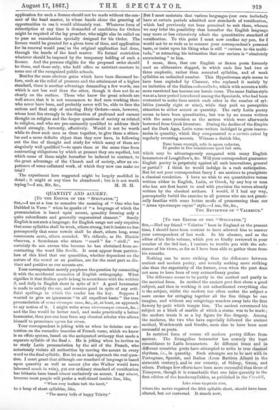QUANTITY AND ACCENT.
[To THE EDITOR OF THE "SPECTATOR."] SIR,—I am at a loss to conceive the meaning of "One who has Dabbled in Verse" when he speaks of "a language of which the pronunciation is based upon accent, quantity forming only a quite subordinate and generally unperceived element." Surely English is not such a language; for English usage not only requires that some syllables shall be weak, others strong, but it insists no less peremptorily that some vowels shall be short, others long, some consonants mute, others sounded. We ridicule, as Dr. Blackie observes, a Scotchman who utters " ceevil " for. " civil ;" we certainly do not excuse him because he has abstained from ac- centuating the word like Seville. It must appear from particu- lars of this kind that our quantities, whether dependent on the nature of the vowel or on position, are for the most part as dis- tinct and positive as our accents are.
Your correspondent merely perplexes the question by connecting it with the accidental anomalies of English orthography. What signifies it that Italian spalle is long in accordance with the written //, and Sally in English short in spite of it ? A good hexameter is made to satisfy the ear, and remains good in spite of any arti- ficial spellings to which the reader has the key. Suppose I wanted to give an ignoramus "in all expedient haste" the true pronunciation of arma virumqzte cano, &e., or, at least, an approach to my notion of it. I might write arum virroommque cannoh, 8ce.; and the line would be better read, and make practically a better hexameter, than you can hear from any classical scholar who allows himself to pronounce vyrum for virtna.
Your correspondent is joking with us when he detains our at- tention on the recondite beauties of French verse, which we know is an effete system, based on the antiquated orthoepy that made a separate syllable of the final e. He is joking when he invites us to study Latin pronunciation by the aid of the French, who notoriously violate all authorities by moving the accent in every word to the final syllable. But let us at last approach the real ques- tion. I must grant that although our standard of language is based upon quantity as well as accent (for else Walker would have laboured much in vain), yet our ordinary standard of versification has hitherto been based almost exclusively on accent. I say almost, because most people will prefer a well-timed iambic line, like,
"When rosy leaflets tuft the larch," to a heap of short syllables, like,
"The merry bells of happy Trinity." But I must maintain that various languages (our own included) have at certain periods admitted new standards of versification, which had previously not been perceived to suit them, whence we may infer the possibility that hereafter the English language may more or less extensively admit the quantitative standard of versification. To this point I must now confine my pen, for I would not be so rude as to censure your correspondent's personal taste, or insist upon his liking what is still "caviare to the multi- tude," or retracting his intimation that our caviare is "absolutely excruciating" to him.
I mean, then, that our English or Saxon poets formerly used an alliterative doggrel, in which each line had two or three emphatic, rather than accented syllables, and of weak syllables an unlimited number. This Hyperborean style seems to have been exploded by Chaucer, who replaced it mainly by an imitation of the Italian endecasilla bo, which with accents a trifle more restricted has become our heroic verse. The same Italian style was at a later period introduced among the Spaniards, who had been contented to make lines match each other in the number of syl- lables (usually eight or nine), while they paid no perceptible attention to either accent or quantity. The early Latin poetry seems to have been quantitative, but was by no means written with the same precision as the metres which were afterwards borrowed from Greek literature. During the decline of the Empire and the Dark Ages, Latin verse-writers indulged in gross inaccu- racies in quantity, which they compensated to a certain extent by regularly recurring accents. Witness a distich like,
Tune homo resurgit, soils in agone reduetas,
Et gaudot in Dee reminiseens quod fuit ante,
which may be advantageously compared with many English hexameters of Longfellow's, &c. Will your correspondent guarantee English poetry in perpetuity against all such innovations, general or partial? I think he would indulge in a rash anticipation. But let not your correspondent fancy I am anxious to precipitate a classical revolution. I have no wish to see quantitative verses written either in English, Latin, or Greek, by any boy or man who has not first learnt to read with precision the verses already written by the classical authors. I would, if I had my way, peremptorily forbid the exercise to all persons who are not practi- cally familiar with some better mode of pronouncing than our " Arma vye-rumque cayno " style.— I am, Sir, &c.,
THE REVIEWER OF " VALERIDS."






























 Previous page
Previous page